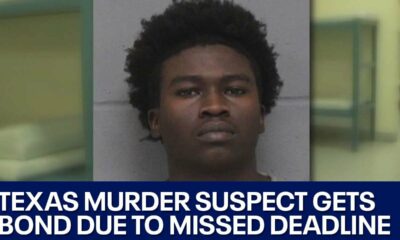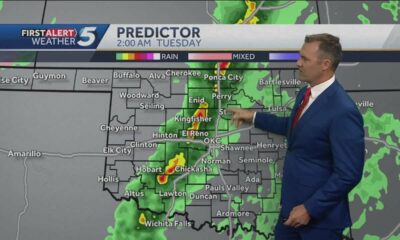Mississippi Today
Mississippi teen among those killed in suspected terrorist attack in New Orleans

NEW ORLEANS (AP) — A driver wrought carnage on New Orleans’ famed French Quarter early on New Year’s Day, killing 10 people as he rammed a pickup truck into a crowd before being shot to death by police, authorities said.
More than 30 people were injured as Wednesday’s attack turned festive Bourbon Street into macabre mayhem.
Among those killed was 18-year-old Nikyra Cheyenne Dedeaux of Gulfport, NOLA.com reported Wednesday. Her mother said that her daughter wasn’t supposed to be in New Orleans, and that she had sneaked over for the night with her 18-year-old cousin and a friend.
“I just want to see my baby,” her mother Melissa Dedeaux, 40, told NOLA.com. “She was the sweetest person. She would give you anything, anything.”
The FBI is investigating the attack as an act of terrorism. An Islamic State group flag was found in the vehicle.
The FBI identified the driver as Shamsud-Din Jabbar, 42, a U.S. citizen from Texas and said it is working to determine Jabbar’s potential associations and affiliations with terrorist organizations. Authorities are also looking into whether other people may have been involved.
Jabbar was killed by police after he exited the vehicle and opened fire on officers, police said. Two officers were shot and are in stable condition, police said. They were in addition to 33 people injured in the vehicle attack.
A photo circulated among law enforcement officials showed a bearded Jabbar wearing camouflage next to the truck after he was killed. The attack happened around 3:15 a.m. in an area teeming with New Year’s revelers.
Investigators recovered a handgun and an AR-style rifle after the shootout, a law enforcement official said. The official was not authorized to discuss details of the investigation publicly and spoke on condition of anonymity.
The FBI said a potential improvised explosive device was located in the vehicle and other potential explosive devices were also located in the French Quarter.
New Orleans Mayor LaToya Cantrell described the killings as a “terrorist attack.”
New Orleans Police Superintendent Anne Kirkpatrick said the driver was “hell-bent on creating the carnage and the damage that he did.”
“It was very intentional behavior. This man was trying to run over as many people as he could,” Kirkpatrick said.
New Orleans city councilmember Helena Moreno told WWL-TV that after being briefed on the attack, she understands that “there is a potential that other suspects could be involved in this and all hands on deck on determining who these individuals are and finding them.”
The area is a prime New Year’s Eve destination, and tens of thousands of college football fans were in the city for Wednesday night’s Sugar Bowl playoff quarterfinal between Georgia and Notre Dame at the nearby Superdome.
“When I got to work this morning, it was kind of pandemonium everywhere,” Derick Fleming, chief bellhop at a downtown hotel, told The Associated Press. “There were a couple of bodies on the ground covered up. Police were looking for bombs in garbage cans.”
University of Georgia President Jere Morehead said a student was critically injured in the attack and is receiving medical treatment.
Zion Parsons told NOLA.com that he and two friends were leaving a Bourbon Street restaurant when he heard a “commotion” and “banging” and turned his head to see a vehicle barreling onto the pavement toward them. He dodged the vehicle, but it struck one of his friends.
“I yell her name, and I turn my head, and her leg is twisted and contorted above and around her back. And there was just blood,” Parsons said. The 18-year-old said he ran after hearing gunshots shortly thereafter.
“As you’re walking down the street, you can just look and see bodies, just bodies of people, just bleeding, broken bones,” he said. “I just ran until I couldn’t hear nothing no more.”
Bourbon Street has had barriers to prevent vehicle attacks since 2017, but Wednesday’s rampage happened amid a major project to remove and replace the devices, which left the area vulnerable. Work began in November and was expected to be largely wrapped up in time for the Super Bowl in the city in February.
Hours after the attack, several coroner’s office vans were parked on the corner of Bourbon and Canal streets, cordoned off by police tape with crowds of dazed tourists standing around, some trying to navigate their luggage through the labyrinth of blockades.
“We looked out our front door and saw caution tape and dead silence and it’s eerie,” said Tessa Cundiff, an Indiana native who moved to the French Quarter a few years ago. “This is not what we fell in love with, it’s sad.”
Elsewhere, life went on as normal in the city known to some for a motto that translates to “let the good times roll.”
Close to where the truck came to rest, some people were talking about the attack while others dressed in Georgia gear talked football. At a cafe a block away, people crowded in for breakfast as upbeat pop music played. Two blocks away, people drank at a bar, seemingly as if nothing happened.
“We recognize that there are tourists around us, and we urge all to avoid the French Quarter as this is an active investigation,” Louisiana Gov. Jeff Landry said. “We understand the concerns of the community and want to reassure everyone that the safety of the French Quarter and the city of New Orleans remains our top priority.”
President Joe Biden, speaking to reporters in Delaware, said he felt “anger and frustration” over the attack but would refrain from further comment until more is known.
“My heart goes out to the victims and their families who were simply trying to celebrate the holiday,” Biden said in a statement. “There is no justification for violence of any kind, and we will not tolerate any attack on any of our nation’s communities.”
The attack is the latest example of a vehicle being used as a weapon to carry out mass violence, a trend that has alarmed law enforcement officials and that can be difficult to protect against.
A 50-year-old Saudi doctor plowed into a Christmas market teeming with holiday shoppers in the German city of Magdeburg last month, killing four women and a 9-year-old boy.
A man who drove his SUV through a Christmas parade in suburban Milwaukee in 2021 is serving a life sentence after a judge rejected arguments from him and his family that mental illness drove him to do it. Six people were killed.
An Islamic extremist was sentenced last year to 10 life sentences for killing eight people with a truck on a bike path in Manhattan on Halloween in 2017. Also in 2017, a self-proclaimed admirer of Adolf Hitler slammed his car into counterprotesters at a white nationalist rally in Charlottesville, Virginia and is now serving a life sentence.
Stephen Smith, Chevel Johnson and Brett Martel in New Orleans, Jeff Martin in Atlanta, Alanna Durkin Richer and Zeke Miller in Washington and Darlene Superville in New Castle, Delaware, contributed to this report.
This article first appeared on Mississippi Today and is republished here under a Creative Commons license.![]()
Mississippi Today
Mississippians honor first Black lawmaker since Reconstruction
Mississippians honor first Black lawmaker since Reconstruction

Former Mississippi Rep. Robert Clark Jr. lay in state Sunday in the Capitol Rotunda as family, friends, officials and fellow citizens paid respect to the first Black legislator in the state since Reconstruction.
Clark, a Holmes County native, was elected to the House in 1967 and served until his retirement in 2004. He was elected speaker pro tempore by the House membership in 1993 and held that second-highest House position until his retirement.
The Senate and House honored the 96-year-old veteran lamaker last week.

“Robert Clark … broke so many barriers in the state of Mississippi with class, resolve and intellect. So he is going to be sorely missed,” Lt. Gov. Delbert Hosemann said last week.
Hosemann was among those who came Sunday to honor Clark. So did House Speaker Jason White, who like Clark hails from Holmes County.

Clark was the only Black Mississippian serving in the Legislature from until 1976 and was ostracized when first elected, sitting at a desk by himself for years without the traditional deskmates. But he rose to become a respected leader.
An educator when elected to the House, Clark served 10 years as chair of the House Education Committee, including when the historic Education Reform Act of 1982 was passed.
Clark served as the only Black Mississippian serving in the Legislature from 1968 until 1976.
“He was a trailblazer and icon for sure,” White said last week.




This article first appeared on Mississippi Today and is republished here under a Creative Commons license.![]()
Mississippi Today
On this day in 1912

March 9, 1912

Charlotta Bass became one of the nation’s first Black female editor-owners. She renamed The California Owl newspaper The California Eagle, and turned it into a hard-hitting publication. She campaigned against the racist film “Birth of a Nation,” which depicted the Ku Klux Klan as heroes, and against the mistreatment of African Americans in World War I.
After the war ended, she fought racism and segregation in Los Angeles, getting companies to end discriminatory practices. She also denounced political brutality, running front-page stories that read, “Trigger-Happy Cop Freed After Slaying Youth.”
When she reported on a KKK plot against Black leaders, eight Klansmen showed up at her offices. She pulled a pistol out of her desk, and they beat a “hasty retreat,”
The New York Times reported. “Mrs. Bass,” her husband told her, “one of these days you are going to get me killed.” She replied, “Mr. Bass, it will be in a good cause.”
In the 1940s, she began her first foray into politics, running for the Los Angeles City Council. In 1951, she sold the Eagle and co-founded Sojourners for Truth and Justice, a Black women’s group. A year later, she became the first Black woman to run for vice president, running on the Progressive Party ticket. Her campaign slogan: “Win or Lose, We Win by Raising the Issues.”
When Kamala Harris became the first Black female vice presidential candidate for a major political party in 2020, Bass’ pioneering steps were recalled.
“Bass would not win,” The Times wrote. “But she would make history, and for a brief time her lifelong fight for equality would enter the national spotlight.”
This article first appeared on Mississippi Today and is republished here under a Creative Commons license.![]()
Mississippi Today
On this day in 1977
On this day in 1977
March 8, 1977

Henry L. Marsh III became the first Black mayor of the former capital of the Confederacy, Richmond, Virginia.
Growing up in Virginia, he attended a one-room school that had seven grades and one teacher. Afterward, he went to Richmond, where he became vice president of the senior class at Maggie L. Walker High School and president of the student NAACP branch.
When Virginia lawmakers debated whether to adopt “massive resistance,” he testified against that plan and later won a scholarship for Howard University School of Law. He decided to become a lawyer to “help make positive change happen.” After graduating, he helped win thousands of workers their class-actions cases and helped others succeed in fighting segregation cases.
“We were constantly fighting against race prejudice,” he recalled. “For instance, in the case of Franklin v. Giles County, a local official fired all of the black public school teachers. We sued and got the (that) decision overruled.”
In 1966, he was elected to the Richmond City Council and later became the city’s first Black mayor for five years. He inherited a landlocked city that had lost 40% of its retail revenues in three years, comparing it to “taking a wounded man, tying his hands behind his back, planting his feet in concrete and throwing him in the water and saying, ‘OK, let’s see you survive.’”
In the end, he led the city from “acute racial polarization towards a more civil society.” He served as president of the National Black Caucus of Elected Officials and as a member of the board of directors of the National League of Cities.
As an education supporter, he formed the Support Committee for Excellence in the Public Schools. He also hosts the city’s Annual Juneteenth Celebration. The courthouse where he practiced now bears his name and so does an elementary school.
Marsh also worked to bridge the city’s racial divide, creating what is now known as Venture Richmond. He was often quoted as saying, “It doesn’t impress me to say that something has never been done before, because everything that is done for the first time had never been done before.”
He died on Jan. 23, 2025, at the age of 91.
This article first appeared on Mississippi Today and is republished here under a Creative Commons license.![]()
-

 News from the South - Louisiana News Feed5 days ago
News from the South - Louisiana News Feed5 days agoRemarkable Woman 2024: What Dawn Bradley-Fletcher has been up to over the year
-

 News from the South - Oklahoma News Feed2 days ago
News from the South - Oklahoma News Feed2 days agoFeed the Children rolls out new program to help Oklahoma families
-

 News from the South - Oklahoma News Feed3 days ago
News from the South - Oklahoma News Feed3 days agoMarch 6,2025: Rain and snow on the way
-

 News from the South - Virginia News Feed7 days ago
News from the South - Virginia News Feed7 days agoProbation ends in termination for Va. FEMA worker caught in mass layoffs
-

 News from the South - Texas News Feed4 days ago
News from the South - Texas News Feed4 days agoTravis County DA failed to meet deadline to indict murder suspect | FOX 7 Austin
-

 News from the South - North Carolina News Feed7 days ago
News from the South - North Carolina News Feed7 days agoConfederate monument in Edenton will remain in place for now
-

 Mississippi Today5 days ago
Mississippi Today5 days agoKey lawmaker reverses course, passes bill to give poor women earlier prenatal care
-

 News from the South - Oklahoma News Feed7 days ago
News from the South - Oklahoma News Feed7 days agoTimeline: Storms bring a risk of tornadoes, damaging winds to Oklahoma (March 3, 2025)












































